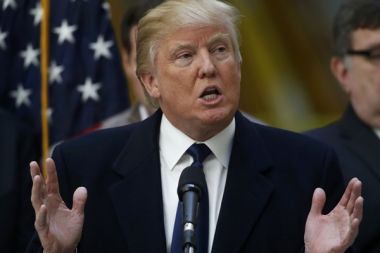Trump vows to destroy oil fields under ISIS control as he lays out his worldview as U.S. president

Republican presidential front-runner Donald Trump revealed that as President of the U.S. he would destroy the oil fields in the Middle East currently under the control of the Islamic State (ISIS), thus depriving the terrorist group its primary source of income.
"I would say knock the hell out of the oil and do it because it's a primary source of money for ISIS," said Trump in a lengthy interview with the New York Times published online on Saturday.
"We have to destroy the oil. We should've taken it and we would've have it."
When asked how he plans to defeat ISIS in Syria, Trump said the President Obama's current approach of fighting the terror group and the forces of President Bashar Assad simultaneously is "madness, and idiocy."
"The far bigger problem than Assad is ISIS, I've always felt that," he said. "Assad is, you know I'm not saying Assad is a good man, 'cause he's not, but our far greater problem is not Assad, it's ISIS."
Trump also disclosed that he plans to stop the purchase of oil from Saudi Arabia and other Arab allies if they refuse to commit ground troops to fight ISIS as part of a U.S.-led coalition or "substantially reimburse" the United States for combating the militant group, which threatens their stability.
"If Saudi Arabia was without the cloak of American protection," Trump said, "I don't think it would be around."
When asked what would merit U.S. humanitarian intervention under a Trump presidency, the brash billionaire said this would be based on how "friendly" a country has been toward the U.S.
Asked how he would handle tensions in the South China Sea, Trump said the best way to halt China's placement of military airfields and antiaircraft batteries on reclaimed islands in the South China Sea was to threaten its access to American markets.
"We have tremendous economic power over China," he argued. "And that's the power of trade."
He said he would use better trade deals to negotiate with China—something he has often promised to do during his campaign. However, he declined to be more specific about his strategy.
"Would I go to war? Look, let me just tell you. There's a question I wouldn't want to answer," Trump said. "I don't want to say what I'd do because, again, we need unpredictability. You know, if I win, I don't want to be in a position where I've said I would or I wouldn't. I don't want them to know what I'm thinking.
"But I will tell you this. This is the one aspect I can tell you. I would use trade, absolutely, as a bargaining chip."
Trump said he would be open to allowing Japan and South Korea to build their own nuclear arsenals rather than depend on the American nuclear umbrella for their protection against North Korea and China.
He also said that he would be willing to withdraw U.S. forces from both Japan and South Korea if they did not substantially increase their contributions to the costs of housing and feeding the U.S. troops.
"We will not be ripped off anymore. We're going to be friendly with everybody, but we're not going to be taken advantage of by anybody," Trump said.
He agreed with a suggestion that his ideas might be summed up as an "America First" policy.
"Not isolationist, but I am America First," he said. "I like the expression."











